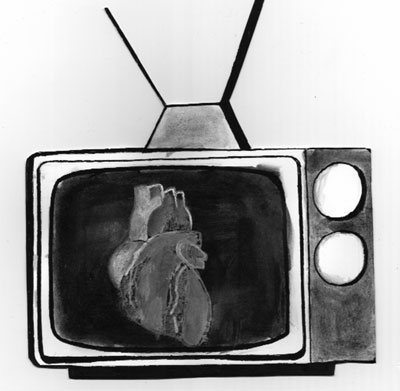All Nonfiction
- Bullying
- Books
- Academic
- Author Interviews
- Celebrity interviews
- College Articles
- College Essays
- Educator of the Year
- Heroes
- Interviews
- Memoir
- Personal Experience
- Sports
- Travel & Culture
All Opinions
- Bullying
- Current Events / Politics
- Discrimination
- Drugs / Alcohol / Smoking
- Entertainment / Celebrities
- Environment
- Love / Relationships
- Movies / Music / TV
- Pop Culture / Trends
- School / College
- Social Issues / Civics
- Spirituality / Religion
- Sports / Hobbies
All Hot Topics
- Bullying
- Community Service
- Environment
- Health
- Letters to the Editor
- Pride & Prejudice
- What Matters
- Back
Summer Guide
- Program Links
- Program Reviews
- Back
College Guide
- College Links
- College Reviews
- College Essays
- College Articles
- Back
TV Is My Life Coach
From Gone With the Wind to Star Wars and from ER to The Office, movies and television tell stories that can change your perspective, alter your understanding, and much more. Many say that TV poisons your brain and that movies are a waste of money. I could not disagree more. Television and films enrich your mind in a way that I believe can only be experienced through visual stimuli on a screen.
I am a TV addict; I watch about 20 shows religiously. My favorites include Downton Abbey, Grey’s Anatomy, and The Mindy Project. While some of the shows I watch are fictitious and somewhat exaggerated, I have learned many valuable lessons from all of them. For example, I constantly learn new mottos to live by from the character played by Maggie Smith in Downton Abbey. In one episode she says, “Never mistake a wish for a certainty,” and while that may seem like common sense, I have repeated that to myself many times since hearing it, constantly putting my hopes in check. This saying resonates with everyone; think of a time when you so badly wanted something to happen that you thought it was certain, only to be let down. For example, in 10th grade I desperately thought that my best friend would finally ask me out on a date, thinking it was certain we would end up together. He though, said we were “just friends” and we remained that way throughout high school. Television shows allow people to make connections based on their own lives. We all have different experiences yet we connect on deeper levels, and television reminds us of our similarities. We take away small morsels of wisdom that translate to our life situations.
I am also an avid movie watcher—whether I’m at the movie theater or on Netflix, I watch about three movies a week. One of my favorite movies is called The Help. The movie is based on a book of the same name, but the visual stimuli I received from the movie made me feel more unique emotions. The Help gave me a better understanding of what life was like for African American maids in the South in the 1960s. While it was obviously dramatized, it still made me empathize with the characters. When African American maid Aibileen is fired after being falsely accused of stealing silver, her employer’s three-year-old daughter cries because the woman who raised her is leaving for good. I nearly started sobbing at the scene—I felt the pain and anguish from Aibileen as she bawls and leaves the baby she raised and says, “You is kind, you is smart, you is important,” as a last reminder to the child who gets no such encouragement from her mother. The Help put me in Aibileen’s shoes and took me on a journey through her life of hardship and prejudice. Movies like The Help are an exercise in empathy and help us to get a better picture of the human experience.
The moral of the story lies in just that—the story. The stories and life lessons that movies and TV share are just as good as the stories in books or that families pass down generation to generation. While television and film are unorthodox ways to express those stories, you receive the same message and feel a unique sense of connection and emotion when you can physically see what transpires. We are all limited to the experiences in our own lives, but when we step into someone else’s world while watching TV or movies, we see a new perspective and can learn from the characters’ successes and failures. Our minds are broadened through television and film, and we become a more empathetic society.

Similar Articles
JOIN THE DISCUSSION
This article has 0 comments.
